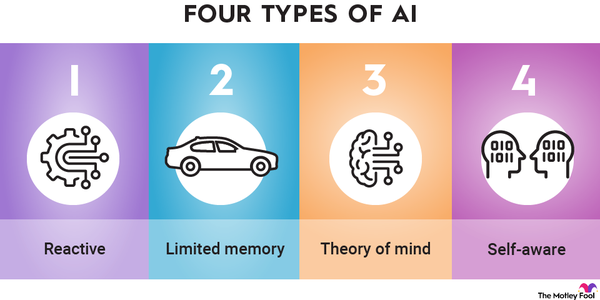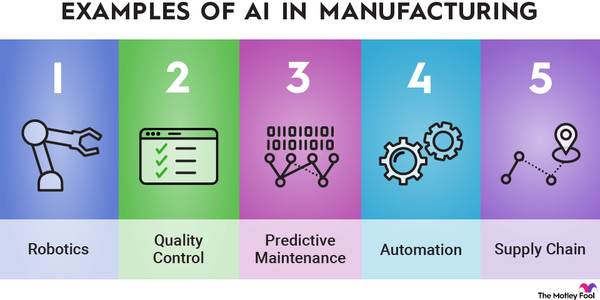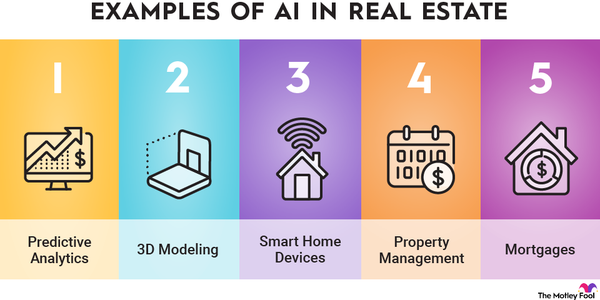Computers excel at crunching numbers but not at the things that many people do with ease, like language processing, visual perception, object manipulation, reasoning, planning, and learning. Artificial intelligence (AI), including its offshoots of deep learning and machine learning, uses computers to perform tasks that typically require human intelligence, such as language generation and facial recognition.

How do companies use AI?
How do companies use artificial intelligence?
Artificial intelligence, or AI, is created through machine learning, which involves training a system with a tremendous amount of data. It then uses the trained system to make inferences about new data it's never seen.
The simplest example is a system designed to detect objects in images. Images containing those objects are provided to the system, which "learns" how to detect them in other images. The more objects it detects in images, the more accurate the detection system becomes.
Companies employ AI in two main ways. Many tech companies use it to make their existing operations more powerful through high-profile applications like robotics, self-driving cars, and virtual assistants. AI is used by Alphabet subsidiary (GOOGL 1.25%) (GOOG 1.31%) Google to filter spam in Gmail, by Amazon (AMZN 1.8%) to recommend products to customers, and by Netflix (NFLX -0.64%) to guide content creation and recommendations.
More recently, OpenAI's ChatGPT has shown how far generative AI -- a division of artificial intelligence capable of generating texts, images, sounds, and ideas -- has come. It can answer questions directly, write poems, and has even passed bar and medical exams. The potential of such large language models is enormous.
Generative AI
Some companies also profit directly from AI by selling hardware, software, services, or expertise that the technology requires. These are true AI stocks and include those listed and described below.
Five AI stocks to buy in 2025
Five AI stocks to buy in 2025
| Company | AI Focus |
|---|---|
| Nvidia (NASDAQ:NVDA) | Data center GPUs and superchips. |
| Alphabet (NASDAQ:GOOG) (NASDAQ:GOOGL) | Generative AI and self-driving cars. |
| Microsoft (NASDAQ:MSFT) | Memory chips for data centers and generative AI tools. |
| Amazon (NASDAQ:AMZN) | Voice-activated technology, cloud computing, and e-commerce. |
| Arm Holdings (NASDAQ:ARM) | Developing power-efficient CPU technology for AI. |
1. Nvidia
Leading graphics processing unit (GPU) company Nvidia has taken advantage of the AI boom, with its GPUs becoming the de facto standard in data centers worldwide. Generative AI's training phase demands a lot of computing power; the phase that follows, the inference phase, requires less. Graphics processing unit (GPU) chips, which were once used primarily for rendering video games, support both phases well.
Nvidia's data center business now makes up the vast majority of the company's revenue, thanks to the emergence of generative AI. Because it sells the building blocks for AI infrastructure, Nvidia became the first major company to see a significant revenue boost from AI. Revenue has surged through 2023 and 2024, and the stock has soared as well; in November 2024, it was the most valuable company in the world.
Its chips are popular for running demanding workloads that applications like large language models require. The pure-play chip stock also just started selling its new Blackwell platform, which major cloud infrastructure services plan to deploy in 2025, and demand is outstripping supply.
Self-driving cars are another area of focus. Nvidia develops hardware and software platforms that can power driver-assistance features and fully autonomous driving, which could be a significant source of revenue if that industry takes off.
A self-driving car must process massive amounts of data from multiple sensors and cameras in real-time, detect objects such as pedestrians and other vehicles, and make complex decisions. They require tremendous computing power -- and that's exactly what Nvidia's platform delivers.
Its professional visualization segment, which includes its omniverse, also has a lot of potential in AI. Nvidia's GPUs could someday be supplanted by more specialized processors designed for AI, but the company is in an enviable position for now.
2. Alphabet
Alphabet has been preparing for the AI revolution for years, acquiring the AI research lab DeepMind in 2014. It's also among the leaders in autonomous vehicles through its Waymo subsidiary, which is now ferrying passengers in its driverless cars in cities like San Francisco and Phoenix.
Alphabet launched Gemini, its own AI chatbot, the latest chatbot iteration in its competition with ChatGPT, which has been seen as a threat to Google Search. So far, concerns about a challenge to its search dominance seem to have been overblown.
With information at the heart of its business, it's unsurprising that the company has prioritized AI. It's rolled out AI tools for Google Cloud and Google Workspace, including a generative AI assistant that helps write emails. Even its customer acquisition strategy in the cloud is based around AI, as the company has targeted AI start-ups for its cloud infrastructure service.
AI also plays a role in improving its search engine and in YouTube, where it can pinpoint a relevant section of a video and direct users straight to it.
3. Microsoft
Microsoft has gotten a lot of buzz lately, thanks to its partnership with OpenAI. The tech giant began investing in the tech start-up in 2019 and recently invested another $10 billion in OpenAI following the launch of ChatGPT.
Microsoft has incorporated GPT features across its product portfolio, including its Azure cloud infrastructure service, Edge web browser, Office productivity software suite, and Copilot for Microsoft 365. Azure OpenAI has seen a particularly strong uptake, now counting more than 65% of the Fortune 500 as customers.
CEO Satya Nadella has repeatedly said that he sees AI as the next major computing platform, and the reported $13 billion investment in OpenAI is a sign of the company's conviction in AI and its belief that it needs to lead that transition or get left behind as it did with mobile.
Microsoft is also harnessing the power of AI in other ways, including automated clinical documentation in healthcare to reduce paperwork and administrative needs. Additionally, it's using Azure to allow customers to build custom AI tools.
4. Amazon
Perhaps no company is using AI more widely than Amazon. Founder and executive chairman Jeff Bezos has long been an evangelist for AI and machine learning, and although Amazon started as an online retailer, technology has always been at the company's core.
Today, Amazon uses AI for everything -- from Alexa, its industry-leading, voice-activated technology, to its Amazon Go cashierless grocery stores, as well as its Amazon Web Services Sagemaker, the cloud infrastructure tool that deploys high-quality machine learning models for data scientists and developers. It also introduced Bedrock, a service for building AI applications, invested in Anthropic AI, the maker of the AI chatbot Claude, and designed its own AI chips, Inferentia and Trainium.
Amazon Bedrock
Amazon's e-commerce business is also built on AI. Algorithms run its top-flight recommendation engines for e-commerce and video and music streaming. In addition, Amazon uses AI to determine product rankings.
Even Amazon's logistics operations benefit from its AI prowess, which helps with scheduling, rerouting, and other improvements to delivery accuracy and efficiency. Drone delivery, which the company has long sought to implement, would be another AI application for the tech giant. It's difficult to quantify AI's impact on Amazon's business, but it's clearly a key component of the company's competitive advantage.
Throughout its history, Amazon has been at the forefront of emerging technologies such as e-commerce, e-books, cloud computing, video streaming, and voice-activated technology. AI provides much of the infrastructure that helps the company move into new businesses quickly and effectively.
5. Arm Holdings
Arm Holdings went public in September 2023, and the chip designer has already established itself as a major player in AI.
Arm has a unique business model. It designs chip components and licenses those designs to partners like Nvidia, cloud infrastructure hyperscalers, and other chipmakers. After licensing those chips, it collects royalties on the revenue from selling products with its designs.
Arm also has an advantage in the AI race. Its chips are known for their power-efficient architecture, and AI applications like ChatGPT demand a lot of power. Using Arm's technology helps minimize its energy consumption.
The chip designer doesn't have close competition for power-efficient CPU architecture, and it's leaning to that advantage, launching Arm Compute Subsystems (CSS), which are chip designs that the purchaser can take to market faster and target specific end users.
Because of the nature of Arm's competitive advantage in power efficiency over the X86 architecture favored by Intel (INTC 1.68%) and Advanced Micro Devices (AMD 3.93%), it's a good bet to benefit from the growth in AI since it's already seeing a surge in license revenue.
Machine learning stocks
Machine learning stocks
All the stocks above use machine learning technologies, but if you're looking for more options, here are two others worth considering:
- Palantir (NASDAQ:PTLR): Palantir has been one of the top-performing AI stocks. The company provides cloud software and specializes in data fusion, meaning it helps its customers make important insights by connecting disparate pieces of information hidden in data. It also launched an AI platform in 2023 that has helped accelerate its growth. Palantir deploys machine-learning models on top of data foundations and continuously improves them to ensure that they become more useful.
- Tesla (TSLA 8.22%): Tesla might be best known for its electric vehicles, but CEO Elon Musk sees AI as the future of the company, and machine learning and neural networks are very much at the center of the company's autonomous vehicle and Optimus autonomous robot projects. Tesla introduced its driverless Cybercab in October 2024, and the company hopes to begin producing the vehicles by 2026.
Deep learning stocks
Deep learning stocks
Deep learning is a subset of machine learning that uses artificial neural networks inspired by the human brain. It's the most advanced kind of AI and is crucial in technologies like self-driving cars. Deep learning is advancing in areas such as preventive healthcare, where predictive algorithms are necessary, and it differs from machine learning in that it doesn't require human input.
Among the companies closely associated with deep learning is Nvidia, whose GPU chips use deep learning to power data centers and enable autonomous driving and cloud computing, among other functions.
Alphabet has exposure to deep learning through a number of its businesses, including its autonomous vehicle start-up, Waymo. It also owns DeepMind, a deep learning platform that can diagnose eye diseases, predict the shapes of proteins, and accelerate the scientific discovery process.
Related investing topics
AI is a growth business
According to International Data Corporation, the global artificial intelligence market is expected to grow from $235 billion in 2024 to more than $631 billion in 2028.
With the AI market already large and still growing quickly, plenty of companies can profit from AI. Although picking stocks in a growth industry comes with a lot of uncertainty, these top AI stocks are all worth considering.
FAQ
Artificial intelligence stocks: FAQ
What is the best AI stock to buy?
Artificial intelligence is a fast-moving technology, and AI stocks will likely be volatile as the sector evolves. Some AI stocks that have attracted the most attention include Nvidia, Microsoft, and Alphabet, but finding the best stock to buy is also a matter of price and valuation, which changes quickly.
Is it good to buy Nvidia stock?
Nvidia has jumped into the lead among semiconductor companies in making AI chips and accelerators, but the space is changing rapidly, and competition is coming from Advanced Micro Devices and others. The semiconductor sector can also be highly cyclical, and pricing can change rapidly. If Nvidia can maintain its lead in AI chips, the stock should continue to be a winner, but the stock will likely be volatile since the AI landscape is still developing.
What is the biggest AI company?
Currently, the biggest company that has made AI central to its business model is Nvidia, with a market cap that has soared past $3 trillion. The tech giant is at the center of the AI revolution as its components are fueling AI applications and are in high demand by major cloud infrastructure companies.
Is AI good for investing?
Artificial intelligence is likely to shake up the economy and the business world, creating opportunities in the stock market as that happens. Whether AI is good for investing will depend on the company, but there will be winners from the new technology.
What company is No. 1 in AI?
Currently, Nvidia is broadly considered the leader in AI technology. The company has a monopoly-like market share in the data center GPU market and its revenue has more than tripled since ChatGPT launched. Nvidia isn't guaranteed to remain the leader, though. Competition is on the way.


























